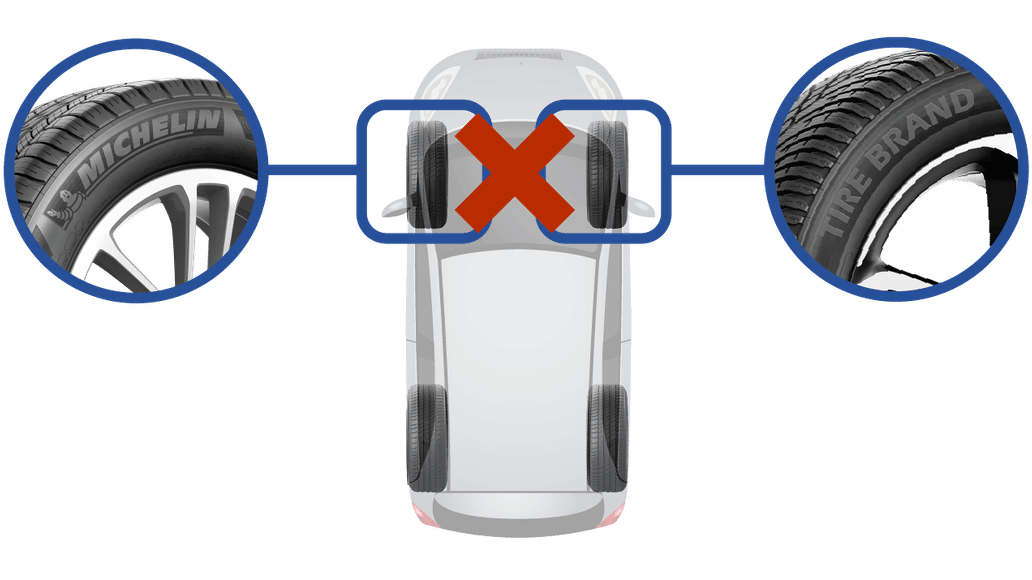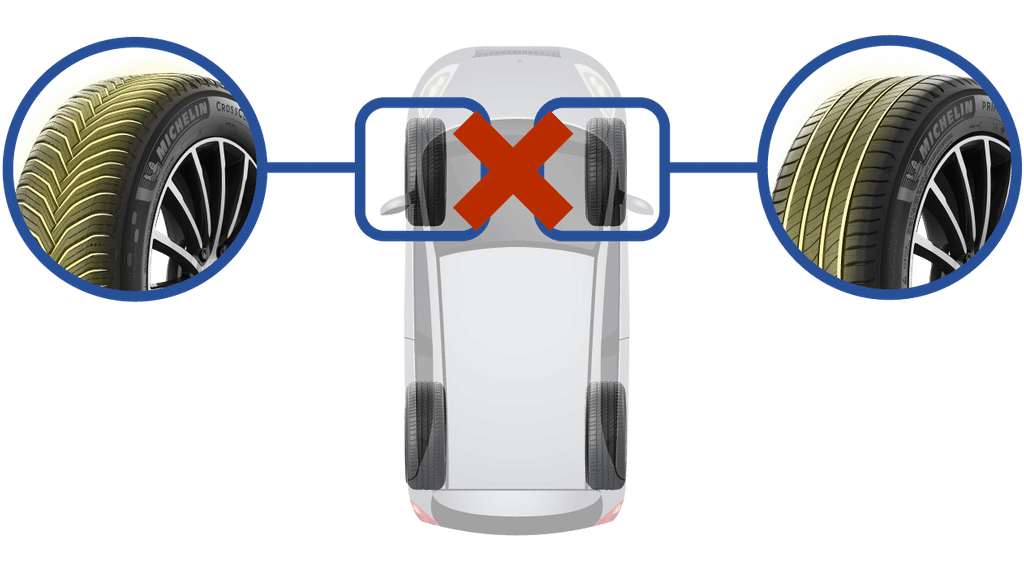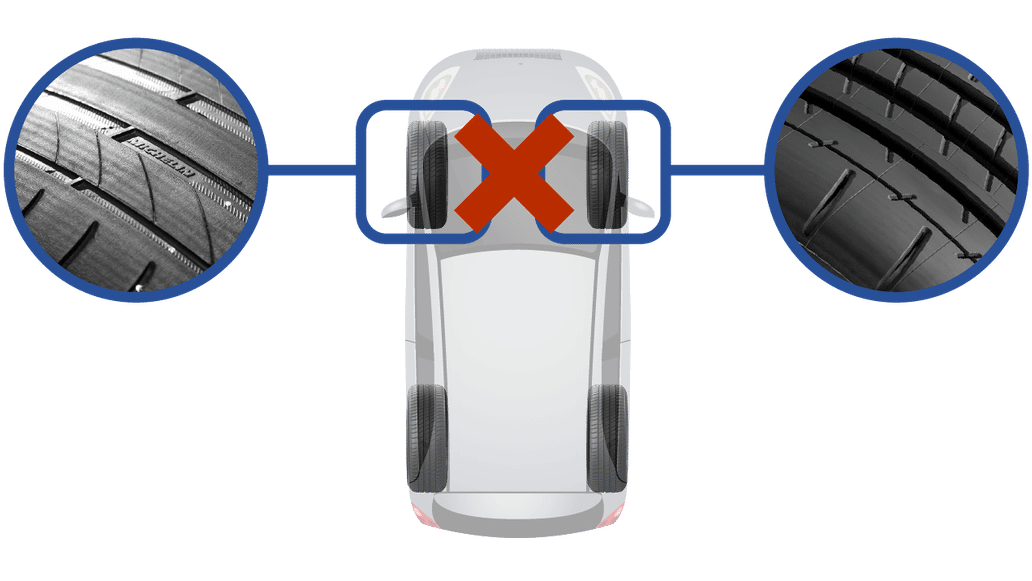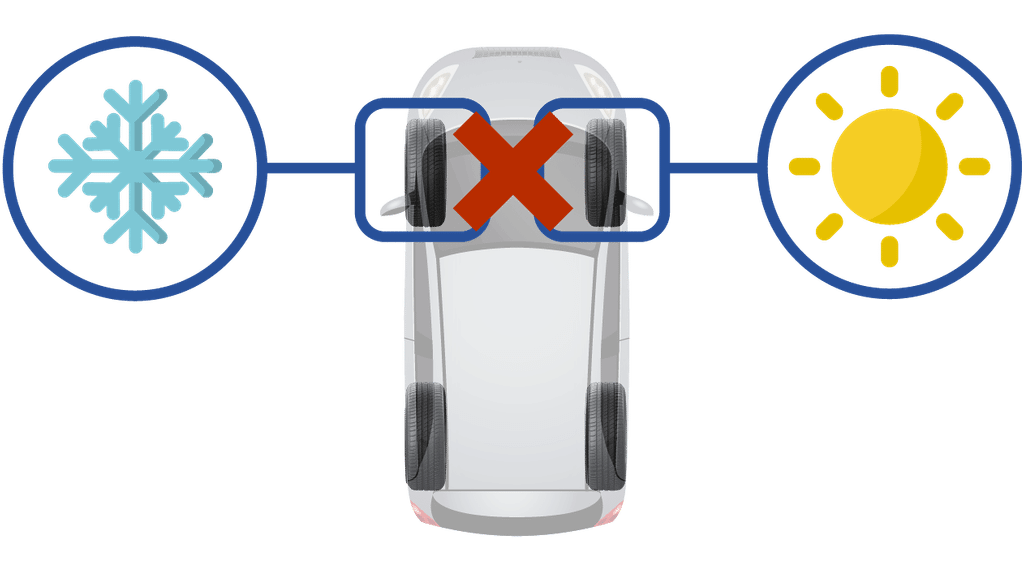Can you mix different tyres?
1 - Fitting different tyres at the FRONT and REAR
Can there be different levels of wear on front and rear tyres?
The tyres on a car wear differently at the front and rear. When you buy a new car or change all four tyres at once, the tyres of a front-wheel drive car tend to wear out faster than the rear tyres. It is therefore normal to have differences in tread depth between the front and rear tyres. The law does not prohibit this as long as the wear indicators are not reached.
Replacing two new tyres: should you put them on the front or the rear?
Deeper tread tyres on the rear axle provide better handling, wet grip, and evacuate water, thereby helping to avoid oversteer and loss of vehicle stability on wet surfaces.
Deeper tread tyres on the front axle can improve wet straight line braking and stopping distance.
If only two tyres are being replaced, MICHELIN generally recommends they be installed on the rear axle in the absence of a tyre service professional's recommendation or consumer's preference to the contrary.
Can you put different brand tyres on the front and rear?
There is no law against it. For example, you can fit MICHELIN tyres at the front and another brand at the rear.
Can there be different treads on the front and rear tyres?
We have seen that it is possible to fit tyres of different brands at the front and rear. It is also possible to fit tyres of the same brand with different tread patterns at the front and rear
Can you mix winter and summer tyres on the front and rear?
Legally, this is not forbidden, but it is not what the Michelin experts recommend. Why not? Because road and weather conditions can cause tyres to behave differently.
For example, if you put summer tyres on the front and winter tyres on the rear: in winter, your rear tyres will grip well and you will not risk a spin.
On the other hand, in summer it will be the other way round: the summer tyre will grip better on dry roads and there will be a risk of "oversteering" with winter tyres on the rear. Oversteer is when the car turns more than it is told to do with the steering wheel: it is the beginning of a spin.
It is therefore not recommended to fit different season tyres at the front and rear, but if this is the case, it is preferable to fit summer tyres at the front and 4-season or winter tyres at the rear.
2 - Fitting different tyres on the same axle
Can you put tyres of different brands, treads, depths or seasons on the same axle?
This is generally prohibited by law.
On the same axle, tyres should even be of the same model. However, there is a tolerance if the use is temporary. For example, if you have a puncture and are driving with your spare wheel. In this case, you should go to a professional as soon as possible to have the tyre replaced.




Why is it forbidden?
It's a matter of dimensions. Different tyre manufacturers aim for different diameters in different tyre models. The circumference can therefore vary if you put a different tyre on the same axle, which can lead to a malfunction of the ESP (Electronic Stability Program), as well as indirect measurements of the inflation pressure.
If the circumference on the left and right is not the same, there will be a difference in rotation speed and the sensor, interpreting that a tyre is under-inflated, will send a warning. In addition, this can cause the vehicle to pull to one side of the road or have a different response on wet roads depending on whether you turn left or right.
Different depths on the left and right: should I replace both my tyres if I have a puncture?
If you have a punctured tyre, your mechanic will fix it if it is repairable or replace it with a new one.
If there is not too much difference between the two tread depths, he will only replace the flat tyre. Otherwise, he will recommend replacing both tyres.
Mixing tyres on 4x4
The impact of the wheels on the differential
When cornering, the inside wheel must run slower than the outside wheel because the magnitude of the two circles is not the same. This is why the differential regulates and prevents both wheels from running at the same speed when cornering.
On 4x4 vehicles, tyres are designed with a different rolling circumference at the front and rear.
They are equipped with a differential that manages the distribution of force sent to the front and rear according to these different circumferences.
If you fit tyres of different circumferences to your 4x4 that are not those for which the vehicle is designed, the differential will become disrupted and will no longer be able to regulate. It is therefore essential to follow the manufacturer's tyre recommendations for this type of vehicle. We also advise you to check the vehicle manufacturer's recommendations before fitting tyres with different wear between the front and rear on a 4x4 vehicle.
If in doubt, consult a professional.